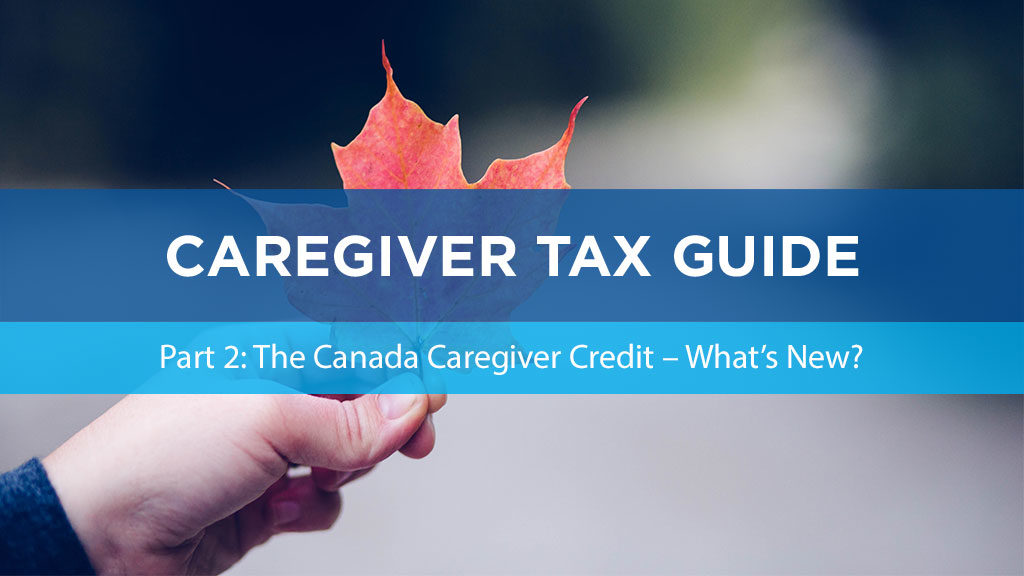
Caregiver tax guide: The Canada Caregiver Credit – What’s New?
There is no question that caregivers are the unsung heroes of Ontario’s health system. While we can’t send you all a certificate of our appreciation, we can point you in the direction of some helpful caregiver tax credits that may relieve the financial burden that comes with caregiving.
The Canada Caregiver Credit (CCC) is a tax credit that is made available to people residing in Canada who must submit an Income Tax Return. It’s provincial counterpart, the Ontario Caregiver Credit (OCC), flows through the same criteria that drives the CCC.
Glenn Hayter of Hayter and Associates Inc., Certified Financial Planner, gives us his insights and answers on the new Canada Caregiver Credit, the Ontario Caregiver Credit and how they might apply to you and your family. This is the second in a series of 3 articles to help you navigate the world of tax refunds in Ontario as a caregiver.
The key thing is that the person supported must be eligible for the Disability Tax Certificate. Learn more about the Disability Tax Certificate in our FAQ.
Here are Glenn’s insights into the most common questions people have about accessing caregiver deductions and credits in Canada.
How can I claim the Canada Caregiver Credit?
“It is important to remember that the CCC is a credit against income taxes owed ,” explains Glenn, “Therefore, a connected person who is providing support must be earning enough income to make use of the tax credit against income taxes owed or the credit is worthless. This may mean that, if there are a number of supporting people, the person who has sufficient taxable income to utilize the credit should be the one to claim it”.
“As with any medical claim, the credit does not start until the total amount of the medical expenses (including mileage and meals) exceeds a threshold, which is 3% of net income up to a maximum.” Learn more about common expenses that you may be eligible to credit.
What previous caregiver tax credits are included in the new Canada Caregiver Credit?
The new CCC replaces the three previous accessible tax credits, including the Caregiver Credit, the Infirm Credit, and the Family Caregiver Tax Credit. Most claims will be unchanged or even increase, with one small difference: Seniors who live with their adult children will need to quality for a Disability Tax Certificate, which can be obtained through one’s family doctor or a specialist.
Who is eligible to receive the Canada Caregiver Credit?
“The eligible people are an individual’s spouse, common-law partner, minor child, parent, grandparent, sibling, uncle, aunt, niece or nephew who is dependent due to mental or physical infirmity. There is no requirement for the dependent live with the taxpayer, but no claim will be available for non-infirm dependents. “
This is one of the biggest changes between the new CCC and the old caregiver credit. Previously, the credit could be claimed for a parent or grandparent over age 65.
But there is a silver lining: “There is a much broader definition of parent to handle situations where an individual raised a child, but the child was not a biological child or formally adopted.”
How to qualify for the Canada Caregiver Credit, and other FAQs.
Our caregiver tax refund series continues:
- Caregiver tax guide: What’s the difference between a tax credit and tax deduction?
- Caregiver tax guide: Your caregiver tax credit questions, answered
We sincerely hope that this three part series helps to give you some insights into how caregivers can access tax credits in Ontario! What other tax refund questions or resources do you have? Get in touch through email at communications@alzheimeront.org, on our Facebook page or on Twitter! We’d love to hear from you.
Written in consultation with:
Glenn Hayter of Hayter and Associates Inc.
Website: www.hayter.on.ca
The Alzheimer Society suggests that you seek professional advice to answer any specific questions about your tax situation.